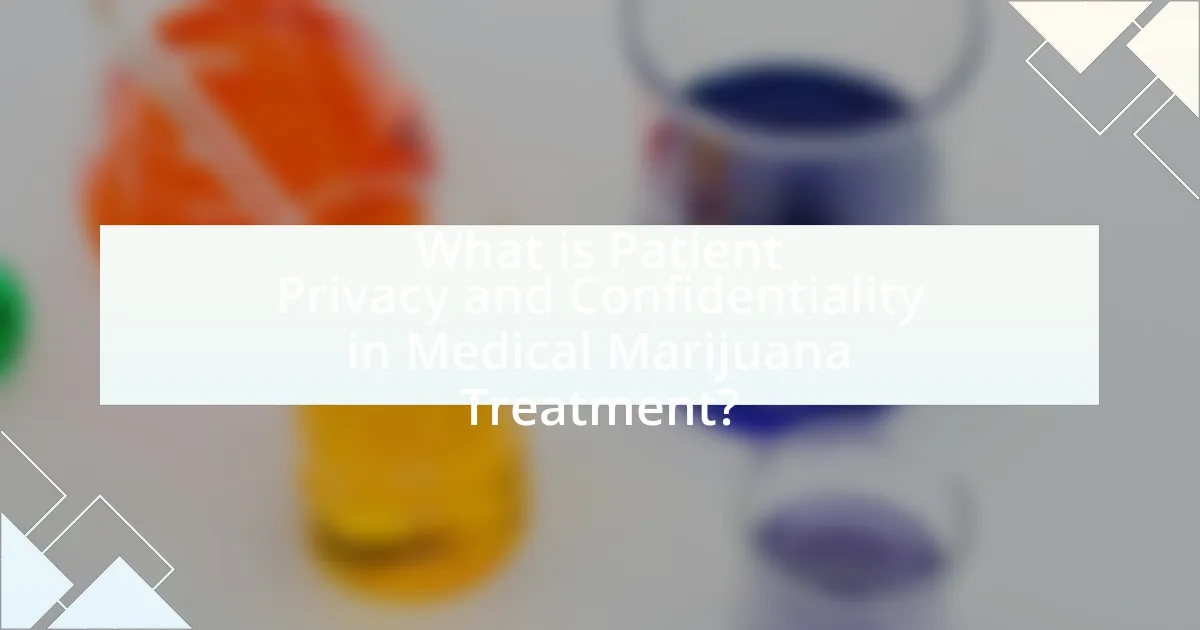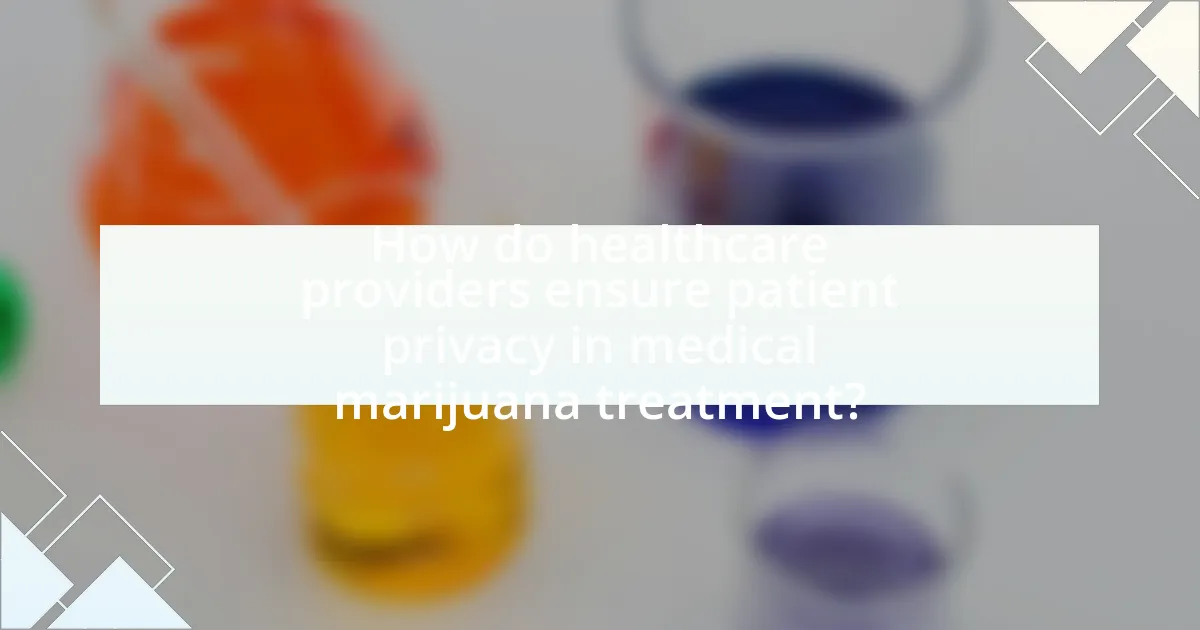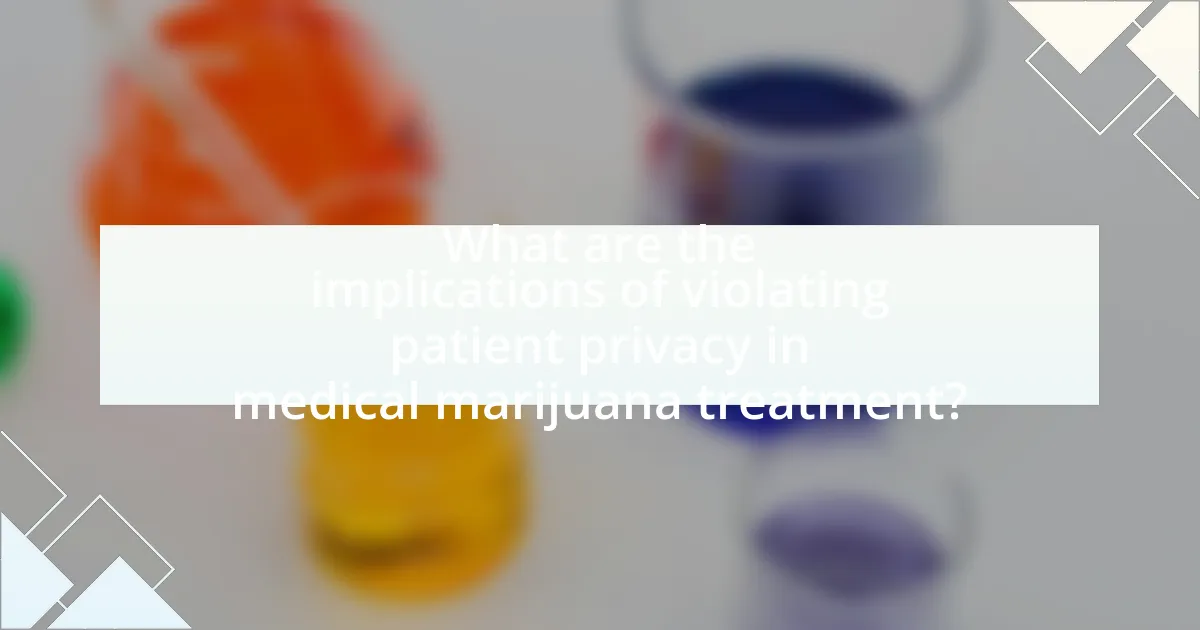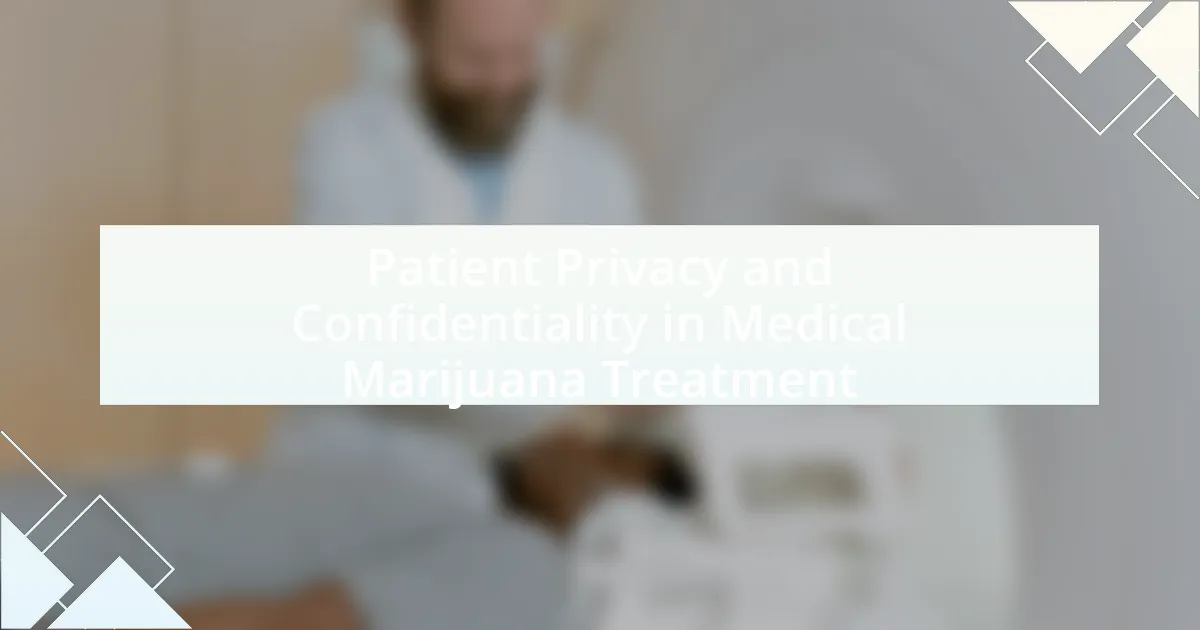Patient privacy and confidentiality in medical marijuana treatment are critical legal and ethical obligations aimed at protecting the personal health information of patients using medical cannabis. This article outlines the importance of safeguarding sensitive health information, the legal implications of privacy violations, and the impact on patient trust and treatment outcomes. Key components of patient confidentiality, challenges in maintaining privacy, and the role of regulations such as HIPAA are discussed, along with best practices for healthcare providers and patients. The article emphasizes the necessity of robust privacy measures to foster trust and ensure effective treatment in the context of medical marijuana use.

What is Patient Privacy and Confidentiality in Medical Marijuana Treatment?
Patient privacy and confidentiality in medical marijuana treatment refer to the legal and ethical obligations to protect the personal health information of patients using medical cannabis. This includes safeguarding details about their medical conditions, treatment plans, and the fact that they are receiving medical marijuana. The Health Insurance Portability and Accountability Act (HIPAA) establishes standards for the protection of patient information, ensuring that healthcare providers maintain confidentiality and only share information with authorized individuals. Violations of these privacy standards can lead to legal repercussions and loss of trust between patients and healthcare providers.
Why is patient privacy important in medical marijuana treatment?
Patient privacy is crucial in medical marijuana treatment because it protects sensitive health information and fosters a trusting relationship between patients and healthcare providers. Ensuring confidentiality encourages patients to seek treatment without fear of stigma or legal repercussions, which is particularly important given the historical context of marijuana use being associated with criminality. Studies indicate that when patients feel their privacy is safeguarded, they are more likely to disclose relevant health information, leading to better treatment outcomes. For instance, a survey by the American Medical Association found that 70% of patients expressed concerns about their privacy when discussing marijuana use with healthcare professionals, highlighting the need for stringent privacy measures in this area.
What are the legal implications of patient privacy in this context?
The legal implications of patient privacy in the context of medical marijuana treatment include compliance with the Health Insurance Portability and Accountability Act (HIPAA), which mandates the protection of patient health information. Violations of HIPAA can result in significant penalties, including fines up to $50,000 per violation and potential criminal charges. Additionally, state laws may impose further restrictions on the disclosure of patient information related to medical marijuana, emphasizing the need for healthcare providers to implement stringent privacy practices. For instance, in California, the Confidentiality of Medical Information Act (CMIA) provides additional protections, reinforcing the legal obligation to safeguard patient data.
How does patient privacy impact patient trust and treatment outcomes?
Patient privacy significantly enhances patient trust and positively influences treatment outcomes. When patients feel confident that their personal health information is secure, they are more likely to disclose sensitive information, which is crucial for accurate diagnosis and effective treatment. Research indicates that 70% of patients are more likely to seek care when they trust that their privacy will be protected (Health Affairs, 2020). Furthermore, a study published in the Journal of Medical Internet Research found that improved patient privacy correlates with higher patient satisfaction and adherence to treatment plans, ultimately leading to better health outcomes. Thus, safeguarding patient privacy is essential for fostering trust and achieving successful treatment results.
What are the key components of patient confidentiality in medical marijuana treatment?
The key components of patient confidentiality in medical marijuana treatment include the protection of personal health information, secure storage of medical records, and adherence to legal regulations regarding patient privacy. Personal health information must be kept confidential to ensure that patients feel safe discussing their medical conditions and treatment options. Secure storage of medical records, whether electronic or paper, is essential to prevent unauthorized access. Additionally, compliance with laws such as the Health Insurance Portability and Accountability Act (HIPAA) in the United States mandates that healthcare providers implement safeguards to protect patient information, reinforcing the importance of confidentiality in medical marijuana treatment.
What types of information are considered confidential?
Confidential information in the context of patient privacy and confidentiality in medical marijuana treatment includes personal health information, treatment history, and any data that can identify a patient. This encompasses medical records, prescription details, and any communication between the patient and healthcare providers. The Health Insurance Portability and Accountability Act (HIPAA) establishes that such information must be protected to ensure patient privacy and prevent unauthorized disclosure.
How is patient information protected in medical marijuana programs?
Patient information in medical marijuana programs is protected through strict confidentiality laws and regulations, such as the Health Insurance Portability and Accountability Act (HIPAA) in the United States. These laws mandate that healthcare providers and dispensaries must implement safeguards to ensure that patient data is kept private and secure. Additionally, many states have specific legislation governing the confidentiality of medical marijuana patient records, which often includes provisions for secure storage and limited access to authorized personnel only. This legal framework is designed to prevent unauthorized disclosure of sensitive patient information, thereby reinforcing patient privacy and confidentiality in medical marijuana treatment.
What challenges exist in maintaining patient privacy and confidentiality?
Maintaining patient privacy and confidentiality in medical marijuana treatment faces several challenges, primarily due to the dual legal status of cannabis and the sensitive nature of health information. The conflicting state and federal laws create ambiguity, making it difficult for healthcare providers to ensure compliance while safeguarding patient data. Additionally, the integration of electronic health records (EHRs) increases the risk of data breaches, as these systems can be vulnerable to cyberattacks. A study by the Ponemon Institute found that healthcare organizations experience an average of 5.6 data breaches per year, highlighting the ongoing threat to patient confidentiality. Furthermore, the stigma associated with medical marijuana use can deter patients from fully disclosing their health information, complicating the provider-patient relationship and potentially impacting care quality.
What are the risks of data breaches in medical marijuana treatment?
Data breaches in medical marijuana treatment pose significant risks to patient privacy and confidentiality. These breaches can lead to unauthorized access to sensitive patient information, including medical histories, treatment plans, and personal identification details. The exposure of such data can result in identity theft, discrimination, and stigmatization of patients who use medical marijuana, as highlighted by a study from the Journal of Medical Internet Research, which found that 30% of patients expressed concerns about their privacy regarding medical marijuana use. Additionally, regulatory non-compliance can lead to legal repercussions for healthcare providers, as they are required to adhere to laws like HIPAA, which mandates the protection of patient information.
How do state and federal laws affect patient confidentiality?
State and federal laws significantly impact patient confidentiality by establishing the legal framework that governs the protection of personal health information. The Health Insurance Portability and Accountability Act (HIPAA) at the federal level sets strict standards for the privacy and security of health information, requiring healthcare providers to safeguard patient data and limiting its disclosure without consent. Conversely, state laws can vary widely; some states may have additional protections or specific regulations regarding the confidentiality of medical marijuana patients, which can enhance or complicate the federal standards. For instance, certain states have enacted laws that explicitly protect the identities of medical marijuana users, thereby reinforcing patient confidentiality beyond federal requirements. This interplay between state and federal laws creates a complex landscape where compliance with both is essential for maintaining patient privacy.

How do healthcare providers ensure patient privacy in medical marijuana treatment?
Healthcare providers ensure patient privacy in medical marijuana treatment by implementing strict confidentiality protocols and adhering to legal regulations such as HIPAA. These protocols include secure storage of patient records, limited access to authorized personnel, and the use of encrypted communication methods. For instance, healthcare facilities often utilize electronic health record systems that comply with privacy standards, ensuring that sensitive information is protected from unauthorized access. Additionally, providers are trained to discuss treatment options discreetly and to obtain informed consent before sharing any patient information, thereby reinforcing the commitment to maintaining patient confidentiality.
What best practices should healthcare providers follow?
Healthcare providers should prioritize patient privacy and confidentiality by implementing strict data protection protocols. This includes ensuring that all patient information is stored securely, using encryption for electronic records, and limiting access to authorized personnel only. According to the Health Insurance Portability and Accountability Act (HIPAA), healthcare providers are legally required to protect patient information, which reinforces the importance of these practices. Additionally, providers should conduct regular training on confidentiality policies and the ethical handling of sensitive information related to medical marijuana treatment, as this can help mitigate risks of data breaches and maintain patient trust.
How can providers train staff on confidentiality protocols?
Providers can train staff on confidentiality protocols by implementing structured training programs that include comprehensive education on legal requirements, ethical standards, and best practices related to patient privacy. These programs should incorporate real-life scenarios and role-playing exercises to enhance understanding and retention of confidentiality principles. Evidence from the Health Insurance Portability and Accountability Act (HIPAA) indicates that regular training can significantly reduce breaches of patient confidentiality, as organizations that conduct annual training sessions report a 30% decrease in privacy violations. Additionally, ongoing assessments and refresher courses can ensure that staff remain informed about updates in laws and regulations, thereby reinforcing the importance of maintaining patient confidentiality in medical marijuana treatment settings.
What technologies can be used to safeguard patient information?
Encryption is a key technology used to safeguard patient information, ensuring that data is transformed into a secure format that can only be accessed by authorized individuals. Additionally, secure access controls, such as multi-factor authentication, help prevent unauthorized access to sensitive patient data. According to a report by the U.S. Department of Health and Human Services, implementing these technologies significantly reduces the risk of data breaches and enhances the overall security of patient information in healthcare settings.
How do patients contribute to their own privacy in medical marijuana treatment?
Patients contribute to their own privacy in medical marijuana treatment by actively managing their personal information and choosing how much to disclose to healthcare providers. By being selective about the details they share, such as their medical history and treatment preferences, patients can limit the amount of sensitive data that is recorded and stored. Additionally, patients can utilize privacy-focused communication methods, such as secure messaging platforms, to discuss their treatment without exposing their information to unauthorized parties. This proactive approach helps safeguard their confidentiality and ensures that their medical records remain protected under laws like HIPAA, which mandates strict guidelines for the handling of patient information.
What steps can patients take to protect their information?
Patients can protect their information by implementing several key steps. First, they should ensure that they use secure communication methods, such as encrypted messaging apps, when discussing sensitive health information. Second, patients must be cautious about sharing personal information online, particularly on social media platforms, where privacy settings may not be robust. Third, they should request that healthcare providers use secure systems for storing and transmitting their medical records, as mandated by regulations like HIPAA, which establishes standards for protecting patient information. Additionally, patients should regularly review their medical records for accuracy and report any discrepancies to their healthcare provider. By taking these steps, patients can significantly enhance the security of their personal health information.
How can patients communicate their privacy preferences to providers?
Patients can communicate their privacy preferences to providers by directly discussing their concerns during consultations. This can include specifying which information they wish to keep confidential, how their data should be shared, and any limitations on communication methods. Research indicates that open dialogue fosters trust and ensures that healthcare providers respect patient autonomy regarding personal health information. For instance, the Health Insurance Portability and Accountability Act (HIPAA) mandates that patients have the right to request restrictions on the use and disclosure of their health information, reinforcing the importance of clear communication about privacy preferences.

What are the implications of violating patient privacy in medical marijuana treatment?
Violating patient privacy in medical marijuana treatment can lead to significant legal, ethical, and personal repercussions. Legally, healthcare providers may face lawsuits or penalties for breaching confidentiality, as mandated by laws such as the Health Insurance Portability and Accountability Act (HIPAA), which protects patient information. Ethically, such violations undermine the trust between patients and providers, potentially discouraging individuals from seeking necessary treatment. Additionally, personal implications may include social stigma, discrimination, or emotional distress for patients whose sensitive information is disclosed without consent. These factors collectively highlight the critical importance of maintaining patient privacy in medical marijuana treatment.
What are the potential consequences for healthcare providers?
Healthcare providers may face legal repercussions, loss of licensure, and damage to their professional reputation due to breaches of patient privacy and confidentiality in medical marijuana treatment. Violating patient confidentiality can lead to lawsuits under privacy laws such as HIPAA, which mandates strict guidelines for handling patient information. For instance, a healthcare provider who discloses a patient’s medical marijuana use without consent could be subject to fines and civil penalties, as evidenced by cases where providers faced significant legal actions for similar breaches. Additionally, the erosion of trust between patients and providers can result in decreased patient engagement and reluctance to seek care, further impacting the provider’s practice and financial stability.
How can violations affect patient-provider relationships?
Violations of patient privacy and confidentiality can severely damage patient-provider relationships by eroding trust. When patients feel that their sensitive information is not protected, they may become reluctant to share important health details, which can hinder effective treatment. Research indicates that trust is a critical component of the therapeutic alliance; for instance, a study published in the Journal of Medical Ethics found that breaches of confidentiality lead to decreased patient satisfaction and increased anxiety about seeking care. This breakdown in communication can ultimately result in poorer health outcomes, as patients may avoid necessary medical consultations or fail to adhere to treatment plans.
What legal actions can patients take in case of privacy breaches?
Patients can take several legal actions in case of privacy breaches, including filing complaints with regulatory bodies, pursuing civil lawsuits for damages, and seeking injunctions to prevent further breaches. Regulatory bodies, such as the Health Insurance Portability and Accountability Act (HIPAA) enforcement agencies, allow patients to report violations, which can lead to investigations and penalties against the offending party. Civil lawsuits can be filed under state privacy laws or HIPAA, where patients may seek compensation for emotional distress, financial losses, or punitive damages. Additionally, patients can request court orders to stop ongoing privacy violations, ensuring their sensitive information is protected. These actions are supported by legal frameworks that emphasize patient rights and confidentiality in healthcare settings.
What role do regulations play in protecting patient privacy?
Regulations play a crucial role in protecting patient privacy by establishing legal frameworks that govern the handling of personal health information. These regulations, such as the Health Insurance Portability and Accountability Act (HIPAA) in the United States, set strict guidelines for healthcare providers regarding the collection, storage, and sharing of patient data. HIPAA mandates that healthcare entities implement safeguards to ensure the confidentiality and security of patient information, thereby reducing the risk of unauthorized access and breaches. Additionally, regulations often include penalties for non-compliance, which further incentivizes adherence to privacy standards and reinforces the importance of protecting patient confidentiality in medical contexts, including medical marijuana treatment.
How do state regulations differ from federal regulations regarding patient confidentiality?
State regulations regarding patient confidentiality often provide more stringent protections than federal regulations. While the Health Insurance Portability and Accountability Act (HIPAA) sets a baseline for patient privacy at the federal level, many states have enacted laws that enhance these protections, particularly in sensitive areas such as medical marijuana treatment. For instance, some states require explicit patient consent for the sharing of medical records related to marijuana use, whereas HIPAA allows for broader sharing under certain circumstances without explicit consent. Additionally, state laws may impose stricter penalties for breaches of confidentiality, reflecting a commitment to safeguarding patient information more rigorously than federal standards.
What recent changes in legislation impact patient privacy in medical marijuana treatment?
Recent changes in legislation impacting patient privacy in medical marijuana treatment include the implementation of stricter data protection laws and regulations that govern the handling of patient information. For instance, several states have enacted laws that require medical marijuana dispensaries to enhance their data security measures, ensuring that patient records are kept confidential and secure from unauthorized access. Additionally, some jurisdictions have introduced provisions that limit the sharing of patient information with third parties without explicit consent, thereby reinforcing patient confidentiality. These legislative updates are designed to align with broader privacy standards, such as those outlined in the Health Insurance Portability and Accountability Act (HIPAA), which emphasizes the protection of personal health information.
What are practical tips for ensuring patient privacy in medical marijuana treatment?
To ensure patient privacy in medical marijuana treatment, healthcare providers should implement strict confidentiality protocols. These protocols include securing patient records through encrypted electronic health systems, limiting access to authorized personnel only, and conducting regular training on privacy laws such as HIPAA. Additionally, providers should utilize private consultation areas to discuss treatment options and ensure that any communication regarding patient care is discreet. Research indicates that maintaining confidentiality not only complies with legal standards but also fosters trust between patients and providers, which is crucial in sensitive areas like medical marijuana treatment.

Leave a Reply